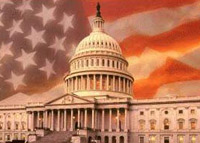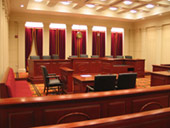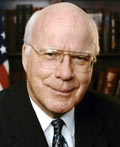|
|
|
Hicks unlikely to break gag order: lawyer
Breaking Legal News |
2007/04/04 03:23
|
Australian Guantanamo Bay detainee David Hicks will not speak to the media in violation of a court order, Hicks' lawyer said Wednesday. Despite statements by Australian Attorney-General Philip Ruddock that Australia cannot enforce the gag order once Hicks returns to the country, Hicks' lawyer told Australia's ABC News that Hicks is not interested in speaking to the media. According to his lawyer, Hicks "is focused on getting home...to be close to his family." Hicks submitted an application Monday to be transferred to a prison near his home in South Australia to serve the remainder of his nine-month sentence after pleading guilty to a charge of supporting terrorism last week. The Australian government is awaiting formal documentation from US authorities to move Hicks from the US prison camp at Guantanamo Bay. Once this information is received, the Australian federal government can approach the state government in South Australia to move the process forward, including assessing security requirements and a potential control order. |
|
|
|
|
|
|
Dems Urge Gonzales Aide to Testify; She Refuses
Breaking Legal News |
2007/04/04 03:23
|
Monica M. Goodling, on leave from her post as special counsel to the US Attorney General, told the House Judiciary Committee on Tuesday that she will not speak to the committee about her role in last year's firing of eight US attorneys. Committee members said that a voluntary interview would forgo the need to subpoena Goodling, but Goodling's lawyer stated that even if she was subpoenaed before the committee, she would claim protection under the Fifth Amendment. Some House representatives doubt her ability to do so, stating that "her claims do not constitute a valid basis for invoking the privilege against self-incrimination." Goodling has said previously that she will refuse to testify before Congressional committees, indicating that she would plead the Fifth Amendment if called to speak. Senate Democrats have rejected attempts by the White House to advance the date that US Attorney General Alberto Gonzales is scheduled to testify on the firings. Gonzales defended his role in the firings on Friday, admitting that there has been some confusion, but saying that his involvement in the matter was limited to signing off on recommendations made by his former chief of staff Kyle Sampson. Sampson, who resigned last month, told the Senate Judiciary Committee last week that the prosecutors were fired for political reasons rather than for poor performance as the Justice Department has claimed. Sampson also said Gonzales did more than merely follow his recommendations, and that Gonzales and former White House counsel Harriet Miers were deeply involved in the firings. |
|
|
|
|
|
|
Mass. governor orders 26 gay marriages registered
Breaking Legal News |
2007/04/03 08:37
|
| Massachusetts Gov. Deval Patrick has directed the Massachusetts Department of Public Health to register the same-sex marriages of 26 couples from outside the state whose licenses were not previously allowed to be included in state records by former Massachusetts Gov. Mitt Romney. The couples were married in 2004 in four Massachusetts towns and cities which refused to follow an order by Romney not to marry out-of-state same-sex couples. Patrick said Monday that he would support the repeal of a 1913 state statute, upheld by the Massachusetts Supreme Court last year, which prohibits couples from marrying in Massachusetts if their marriage would not be legal in their own state. Earlier this year, Massachusetts lawmakers lobbied for a proposed constitutional ban on same-sex marriage which would strictly define marriage as a union between a man and a woman, though it would leave existing Massachusetts same-sex marriages intact. While the recognition of the 26 marriage certificates does not actually change the legal status of the marriages, Patrick's decision has been heralded by the Gay and Lesbian Advocates and Defenders (GLAD) as a move toward treating same-sex couples equally to heterosexual couples. Patrick's order was criticized, however, by the Massachusetts Family Institute which said Patrick was "placing his personal preference above the law." Massachusetts is currently the only US state to recognize same-sex marriage, after a November 2003 state high court ruling, and more than 8,000 same-sex couples have since been wed there. |
|
|
|
|
|
|
2 Judges, Attorney Convicted Of Bribery
Breaking Legal News |
2007/04/02 19:12
|
| A federal jury in Jackson, Miss., has convicted Biloxi attorney Paul S. Minor, former Mississippi state chancery court judge Walter W. Teel, and former Mississippi state court circuit judge John H. Whitfield of charges related to their role in a bribery scheme in which Minor provided Teel and Whitfield with money and other things of value in exchange for favorable rulings in cases brought before the judges by Minor's law firm, Assistant Attorney General Alice S. Fisher of the Criminal Division announced today. The jury found the defendants guilty on March 30 of all 14 charges in a December 2005 indictment, following a 20-day trial and a day of deliberations. The Honorable Henry T. Wingate, Chief Judge, U.S. District Court for the Southern District of Mississippi, presided over the trial. The jury convicted Minor, 61, of conspiring with Teel and Whitfield; six counts of honest services mail fraud; one count of honest services wire fraud; two counts of bribing and employee of state agency that received federal funds; and one count of the Racketeer Influenced Corrupt Organizations (RICO) statute, for the use of the employees and resources of his law firm, Minor & Associates, to accomplish and further a pattern of racketeering activity that included bribery of Whitfield and wire fraud in connection with the payoff of a loan to Whitfield. Teel, 56, was convicted of conspiring with Minor in a bribery scheme; two counts of using the mails to deprive the citizens of Mississippi of the intangible right to his honest services; and one count of federal program bribery. Whitfield, 44, was found guilty of conspiring with Minor in a bribery scheme; four counts of honest services mail fraud; one count of using the wires in a scheme to deprive the citizens of Mississippi to the intangible right to his honest services; and one count of federal program bribery. "The jury's conviction of attorney Paul Minor and former Judges Walter Teel and John Whitfield sends an important message – we will not tolerate the bribery of judges to influence matters before the court," said Assistant Attorney General Fisher. "The American people expect and demand a system of justice that is free of corruption. We will prosecute those who attempt to buy or sell positions of high public trust for their own financial benefit." The jury heard evidence that, in November 1998, Minor guaranteed a $25,000 line of credit for Teel at a Biloxi bank while Teel was a candidate for a judgeship in chancery court of Harrison County. The line of credit purported to be for campaign expenses. After Teel was elected, Minor, in an effort to conceal the fact that he was paying off the loan himself, used cash and an intermediary to disguise the true source of the loan payments. Thereafter, then-Judge Teel was assigned to a civil case in chancery court in which Minor's firm represented a local bank in a bad faith declination of coverage suit against the bank's insurance provider. The case was to be tried without a jury. In 2001, as the case proceeded, Teel made favorable rulings for Minor's client on issues of discovery and summary judgment. Around that time, then-Judge Teel and two other chancery court judges became the subject of a state criminal investigation for misappropriation of funds. Among the efforts Minor made to assist the judges under investigation was a meeting Minor arranged between the judges and the then-Attorney General of Mississippi. Minor provided transportation to the meeting via his private jet and also hired a public relations firm to assist the judges. After Teel was indicted on state charges, Minor paid a portion of the legal expenses for Teel's defense. Teel was ultimately acquitted. Within weeks of the meeting with the Attorney General, Teel presided over a settlement conference in the lawsuit between Minor and the attorneys for the bank's insurance provider. During the negotiation, Teel made statements to the parties indicating his belief in the strength of the plaintiff's case and insinuated that, were the defendants to push the case to trial, Teel would be inclined to award punitive damages to the plaintiff. The insurance provider promptly agreed to settle the case for $1.5 million dollars. None of the attorneys representing the insurance provider were made aware of the financial relationship between Teel and Minor. The jury also heard evidence that, in November 1998, Minor guaranteed a $40,000 loan for Whitfield at a Biloxi bank while Whitfield was a candidate for re-election to the Circuit Court of Harrison County. The loan purported to be for campaign expenses. After Whitfield was elected, Minor guaranteed an additional loan for then-Judge Whitfield for $100,000, purportedly for the down payment on a house. Minor, in an effort to conceal the fact that he was actually paying off the loans himself, used cash and an intermediary to disguise the true source of the loan payments. Whitfield was later assigned to a personal injury case in circuit court in which Minor's firm represented an oil rig worker injured as a result of his employer's alleged negligence. Whitfield presided over the trial and found in favor of Minor's firm's client. He awarded damages in the amount of $3.75 million dollars, an award he later reduced by approximately $100,000. Minor continued to disguise the fact that he was making payments on the Whitfield loans and ultimately paid them off through the use of an intermediary. Minor, Teel and Whitfield each face a maximum sentence of five years in prison and a $250,000 fine on the conspiracy charges; 10 years in prison and a $250,000 fine on the federal program bribery charges; and 20 years in prison and a $250,000 fine on the honest services mail/wire fraud charges. Minor also faces a maximum sentence of 20 years in prison and a $250,000 fine on the RICO charge. Sentencing is scheduled for June 14, 2007. The verdict is the result of the second trial in this matter. The previous trial, conducted in the summer of 2005, involved similar allegations against Minor, Teel, Whitfield, and Mississippi Supreme Court Justice Oliver Diaz. The jury acquitted Diaz of all charges, acquitted Minor on the charges related to Diaz, but was unable to reach a verdict on the remaining charges. The case was prosecuted jointly by the U.S. Department of Justice, Public Integrity Section, and the U.S. Attorney's Office for the Southern District of Mississippi. The case was tried by Assistant U.S. Attorneys Ruth R. Morgan and David H. Fulcher; and Trial Attorney Natashia Tidwell of the Public Integrity Section, headed by Chief William M. Welch, II. Senior Deputy Chief Peter J. Ainsworth of the Public Integrity Section participated in the investigation and indictment of this matter. The case was investigated by the Federal Bureau of Investigation. |
|
|
|
|
|
|
New Mexico approves medical use of marijuana
Breaking Legal News |
2007/04/02 19:09
|
| New Mexico doctors are allowed to prescribe marijuana to help some seriously ill patients manage symptoms including pain and nausea under a bill signed into law by Governor Bill Richardson on Monday. "This law will provide much-needed relief for New Mexicans suffering from debilitating diseases," Richardson said at the signing ceremony. "It is the right thing to do." The south-western state is the 12th in the United States to endorse the use of marijuana for medical uses. New Mexico's state legislature is the fourth in the country to enact such a measure. The law allows marijuana use by patients suffering from several conditions, such as HIV and Aids, cancer, glaucoma, and multiple sclerosis and epilepsy, according to a news release from Richardson's office. California began allowing similar use of marijuana in 1996. In 1978, New Mexico began allowing very limited use of marijuana, or its active ingredient, THC, to help control cancer patients' nausea and vomiting caused by chemotherapy, but only when other nausea-control drugs failed. The law creates a panel of eight expert physicians and other health care workers to supervise the program. Qualified patients must be under a doctor's care and supervision, the news release said. "I would like to thank the governor for... giving me another shot at life," said Essie DeBone, who suffers from advanced complications from HIV and Aids. |
|
|
|
|
|
|
Leahy: Gonzales 'has not been truthful'
Breaking Legal News |
2007/04/02 09:41
|
| US Sen. Patrick Leahy (D-VT) Sunday rejected attempts by the Bush administration to move up the date that US Attorney General Alberto Gonzales is scheduled to testify regarding his role in the firings of eight US Attorneys. White House counselor Dan Bartlett urged the US Senate Judiciary Committee to push up Gonzales' testimony from April 17 to next week, but committee chairman Leahy said Gonzales himself chose the mid-April date after declining earlier offered dates, so the schedule would not be changed now. Meanwhile, comments made by Senate GOP leader Mitch McConnell (R-KY) regarding Gonzales' inconsistent explanations of his involvement in the firings did not resound with confidence in the attorney general. McConnell did not express his own backing of Gonzales, but said President Bush has confidence in Gonzales "at the moment."
|
|
|
|
|
|
|
Hick's father says plea deal proves case corruption
Breaking Legal News |
2007/04/01 10:23
|
| Guantanamo inmate David Hicks, gagged from speaking to the media, will soon return to Australia from Cuba under a plea deal that reflects the weakness of the prosecution case and political needs of a close US ally, his father said today. "The military commission system is transparent all right – transparently corrupt," Terry Hicks said, exuberant about the leniency of his son's sentence but still furious about the treatment the 31-year-old Muslim convert has endured for five years. David Hicks will serve a nine-month sentence in a prison in his hometown of Adelaide after admitting last week that he aided al-Qaida in a plea deal at the US naval base at Guantanamo Bay. The deal prevents him from talking to the media for 12 months or pursuing his allegations of abuse while in US custody. Legal observers and opposition lawmakers have joined Terry Hicks in saying the deal is tailored to remove potential political embarrassment for Australian Prime Minister John Howard, who will seek his fifth three-year term as national leader at elections due later this year. |
|
|
|
|
|
|
Class action or a representative action is a form of lawsuit in which a large group of people collectively bring a claim to court and/or in which a class of defendants is being sued. This form of collective lawsuit originated in the United States and is still predominantly a U.S. phenomenon, at least the U.S. variant of it. In the United States federal courts, class actions are governed by Federal Rules of Civil Procedure Rule. Since 1938, many states have adopted rules similar to the FRCP. However, some states like California have civil procedure systems which deviate significantly from the federal rules; the California Codes provide for four separate types of class actions. As a result, there are two separate treatises devoted solely to the complex topic of California class actions. Some states, such as Virginia, do not provide for any class actions, while others, such as New York, limit the types of claims that may be brought as class actions. They can construct your law firm a brand new website and help you redesign your existing law firm site to secure your place in the internet. |
Law Firm Directory
|
|









